Cross-Cultural Management: US vs. Tanzania Case Study Report
VerifiedAdded on 2023/01/23
|8
|2279
|20
Report
AI Summary
This report delves into the complexities of cross-cultural management, examining how national cultures impact business practices, particularly in international settings. The report begins with an introduction to cross-cultural management and defines national culture. It presents a case study involving a US-based company, Hydro Generation, and its challenges in managing a project in Tanzania, highlighting cultural differences and their influence on work dynamics. The report then applies Hofstede's cultural dimensions theory to compare US and Tanzanian cultures, analyzing power distance, individualism versus collectivism, masculinity versus femininity, uncertainty avoidance, long-term orientation, and indulgence versus restraint. A scripted podcast based on the case study further illustrates these cultural differences. The report includes a reflexive report detailing the author's learning experience, including the development of communication, leadership, and problem-solving skills, as well as an increased understanding of international business challenges. The conclusion emphasizes the importance of understanding cultural differences in international business and highlights the skills gained from the study. The report also provides a list of references for further reading.

CROSS CULTURE
MANAGEMENT
MANAGEMENT
Paraphrase This Document
Need a fresh take? Get an instant paraphrase of this document with our AI Paraphraser
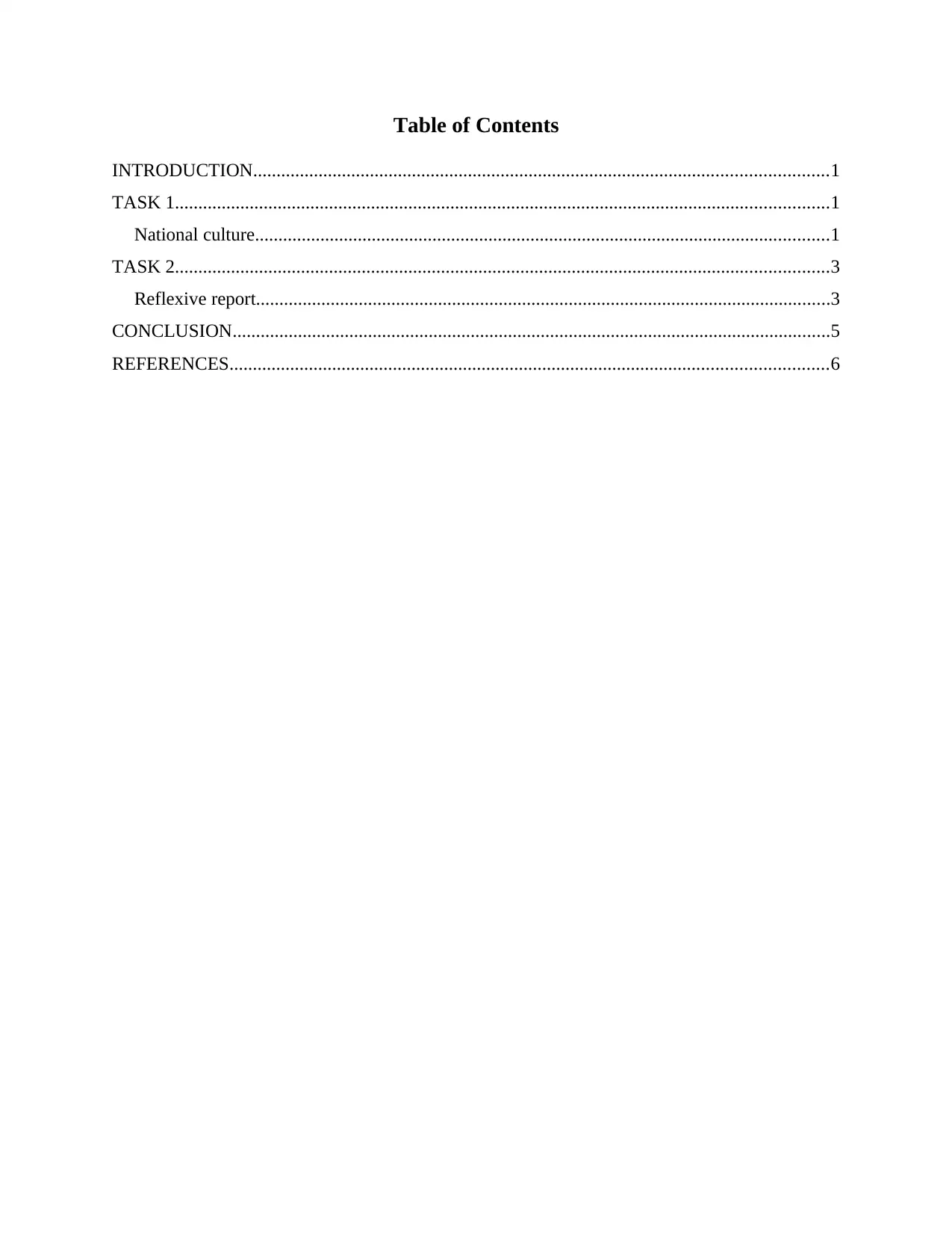
Table of Contents
INTRODUCTION...........................................................................................................................1
TASK 1............................................................................................................................................1
National culture...........................................................................................................................1
TASK 2............................................................................................................................................3
Reflexive report...........................................................................................................................3
CONCLUSION................................................................................................................................5
REFERENCES................................................................................................................................6
INTRODUCTION...........................................................................................................................1
TASK 1............................................................................................................................................1
National culture...........................................................................................................................1
TASK 2............................................................................................................................................3
Reflexive report...........................................................................................................................3
CONCLUSION................................................................................................................................5
REFERENCES................................................................................................................................6
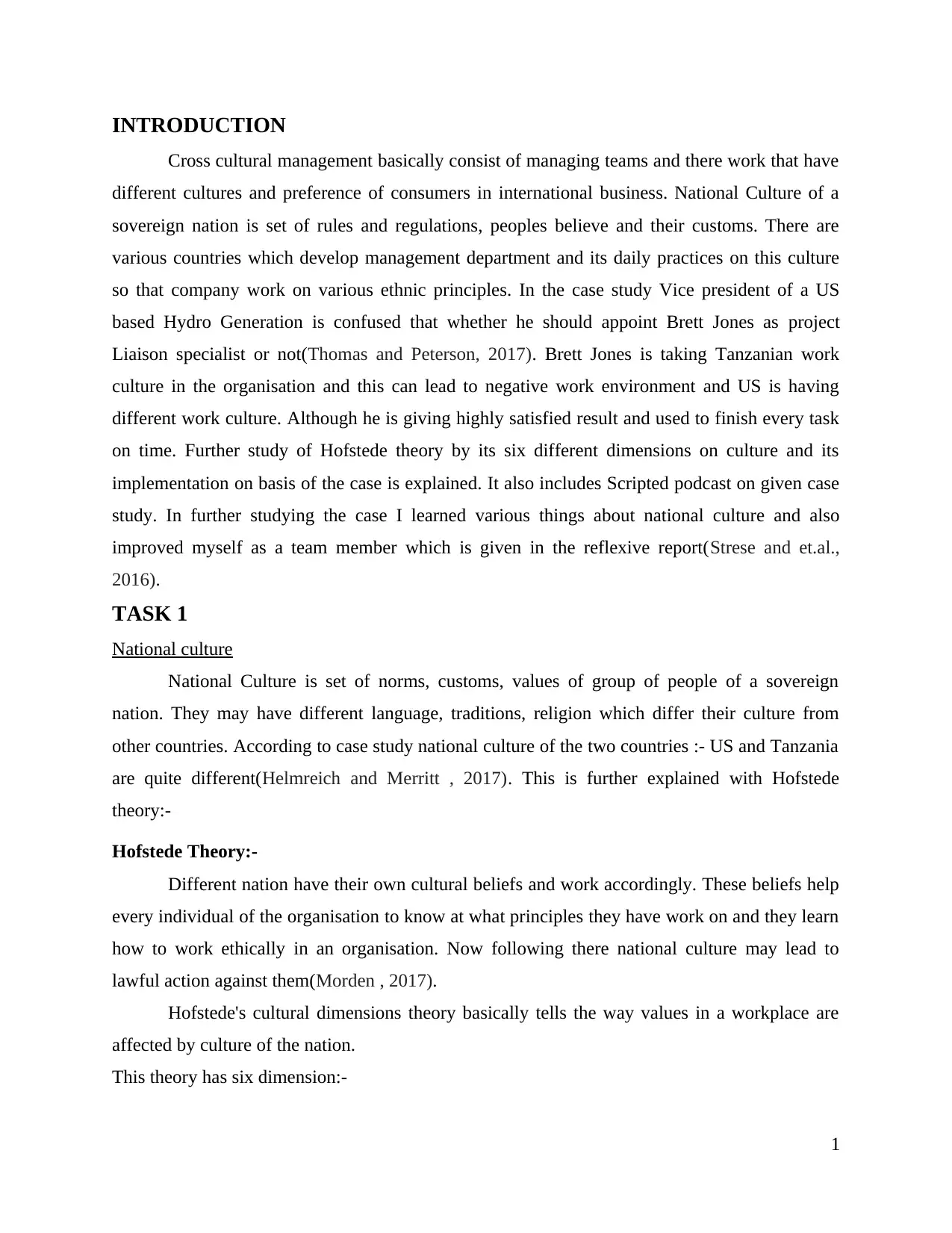
INTRODUCTION
Cross cultural management basically consist of managing teams and there work that have
different cultures and preference of consumers in international business. National Culture of a
sovereign nation is set of rules and regulations, peoples believe and their customs. There are
various countries which develop management department and its daily practices on this culture
so that company work on various ethnic principles. In the case study Vice president of a US
based Hydro Generation is confused that whether he should appoint Brett Jones as project
Liaison specialist or not(Thomas and Peterson, 2017). Brett Jones is taking Tanzanian work
culture in the organisation and this can lead to negative work environment and US is having
different work culture. Although he is giving highly satisfied result and used to finish every task
on time. Further study of Hofstede theory by its six different dimensions on culture and its
implementation on basis of the case is explained. It also includes Scripted podcast on given case
study. In further studying the case I learned various things about national culture and also
improved myself as a team member which is given in the reflexive report(Strese and et.al.,
2016).
TASK 1
National culture
National Culture is set of norms, customs, values of group of people of a sovereign
nation. They may have different language, traditions, religion which differ their culture from
other countries. According to case study national culture of the two countries :- US and Tanzania
are quite different(Helmreich and Merritt , 2017). This is further explained with Hofstede
theory:-
Hofstede Theory:-
Different nation have their own cultural beliefs and work accordingly. These beliefs help
every individual of the organisation to know at what principles they have work on and they learn
how to work ethically in an organisation. Now following there national culture may lead to
lawful action against them(Morden , 2017).
Hofstede's cultural dimensions theory basically tells the way values in a workplace are
affected by culture of the nation.
This theory has six dimension:-
1
Cross cultural management basically consist of managing teams and there work that have
different cultures and preference of consumers in international business. National Culture of a
sovereign nation is set of rules and regulations, peoples believe and their customs. There are
various countries which develop management department and its daily practices on this culture
so that company work on various ethnic principles. In the case study Vice president of a US
based Hydro Generation is confused that whether he should appoint Brett Jones as project
Liaison specialist or not(Thomas and Peterson, 2017). Brett Jones is taking Tanzanian work
culture in the organisation and this can lead to negative work environment and US is having
different work culture. Although he is giving highly satisfied result and used to finish every task
on time. Further study of Hofstede theory by its six different dimensions on culture and its
implementation on basis of the case is explained. It also includes Scripted podcast on given case
study. In further studying the case I learned various things about national culture and also
improved myself as a team member which is given in the reflexive report(Strese and et.al.,
2016).
TASK 1
National culture
National Culture is set of norms, customs, values of group of people of a sovereign
nation. They may have different language, traditions, religion which differ their culture from
other countries. According to case study national culture of the two countries :- US and Tanzania
are quite different(Helmreich and Merritt , 2017). This is further explained with Hofstede
theory:-
Hofstede Theory:-
Different nation have their own cultural beliefs and work accordingly. These beliefs help
every individual of the organisation to know at what principles they have work on and they learn
how to work ethically in an organisation. Now following there national culture may lead to
lawful action against them(Morden , 2017).
Hofstede's cultural dimensions theory basically tells the way values in a workplace are
affected by culture of the nation.
This theory has six dimension:-
1
⊘ This is a preview!⊘
Do you want full access?
Subscribe today to unlock all pages.

Trusted by 1+ million students worldwide
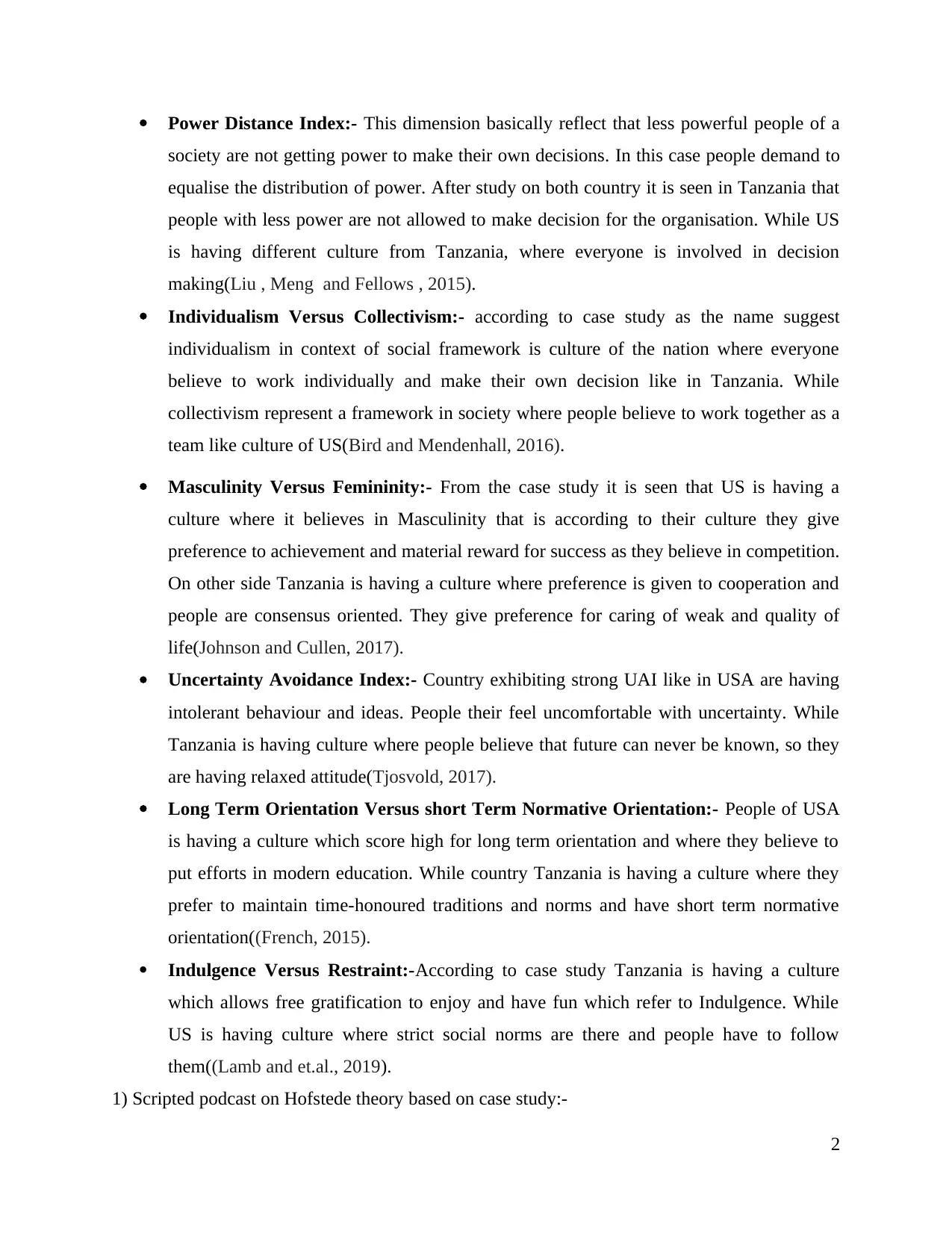
Power Distance Index:- This dimension basically reflect that less powerful people of a
society are not getting power to make their own decisions. In this case people demand to
equalise the distribution of power. After study on both country it is seen in Tanzania that
people with less power are not allowed to make decision for the organisation. While US
is having different culture from Tanzania, where everyone is involved in decision
making(Liu , Meng and Fellows , 2015).
Individualism Versus Collectivism:- according to case study as the name suggest
individualism in context of social framework is culture of the nation where everyone
believe to work individually and make their own decision like in Tanzania. While
collectivism represent a framework in society where people believe to work together as a
team like culture of US(Bird and Mendenhall, 2016).
Masculinity Versus Femininity:- From the case study it is seen that US is having a
culture where it believes in Masculinity that is according to their culture they give
preference to achievement and material reward for success as they believe in competition.
On other side Tanzania is having a culture where preference is given to cooperation and
people are consensus oriented. They give preference for caring of weak and quality of
life(Johnson and Cullen, 2017).
Uncertainty Avoidance Index:- Country exhibiting strong UAI like in USA are having
intolerant behaviour and ideas. People their feel uncomfortable with uncertainty. While
Tanzania is having culture where people believe that future can never be known, so they
are having relaxed attitude(Tjosvold, 2017).
Long Term Orientation Versus short Term Normative Orientation:- People of USA
is having a culture which score high for long term orientation and where they believe to
put efforts in modern education. While country Tanzania is having a culture where they
prefer to maintain time-honoured traditions and norms and have short term normative
orientation((French, 2015).
Indulgence Versus Restraint:-According to case study Tanzania is having a culture
which allows free gratification to enjoy and have fun which refer to Indulgence. While
US is having culture where strict social norms are there and people have to follow
them((Lamb and et.al., 2019).
1) Scripted podcast on Hofstede theory based on case study:-
2
society are not getting power to make their own decisions. In this case people demand to
equalise the distribution of power. After study on both country it is seen in Tanzania that
people with less power are not allowed to make decision for the organisation. While US
is having different culture from Tanzania, where everyone is involved in decision
making(Liu , Meng and Fellows , 2015).
Individualism Versus Collectivism:- according to case study as the name suggest
individualism in context of social framework is culture of the nation where everyone
believe to work individually and make their own decision like in Tanzania. While
collectivism represent a framework in society where people believe to work together as a
team like culture of US(Bird and Mendenhall, 2016).
Masculinity Versus Femininity:- From the case study it is seen that US is having a
culture where it believes in Masculinity that is according to their culture they give
preference to achievement and material reward for success as they believe in competition.
On other side Tanzania is having a culture where preference is given to cooperation and
people are consensus oriented. They give preference for caring of weak and quality of
life(Johnson and Cullen, 2017).
Uncertainty Avoidance Index:- Country exhibiting strong UAI like in USA are having
intolerant behaviour and ideas. People their feel uncomfortable with uncertainty. While
Tanzania is having culture where people believe that future can never be known, so they
are having relaxed attitude(Tjosvold, 2017).
Long Term Orientation Versus short Term Normative Orientation:- People of USA
is having a culture which score high for long term orientation and where they believe to
put efforts in modern education. While country Tanzania is having a culture where they
prefer to maintain time-honoured traditions and norms and have short term normative
orientation((French, 2015).
Indulgence Versus Restraint:-According to case study Tanzania is having a culture
which allows free gratification to enjoy and have fun which refer to Indulgence. While
US is having culture where strict social norms are there and people have to follow
them((Lamb and et.al., 2019).
1) Scripted podcast on Hofstede theory based on case study:-
2
Paraphrase This Document
Need a fresh take? Get an instant paraphrase of this document with our AI Paraphraser
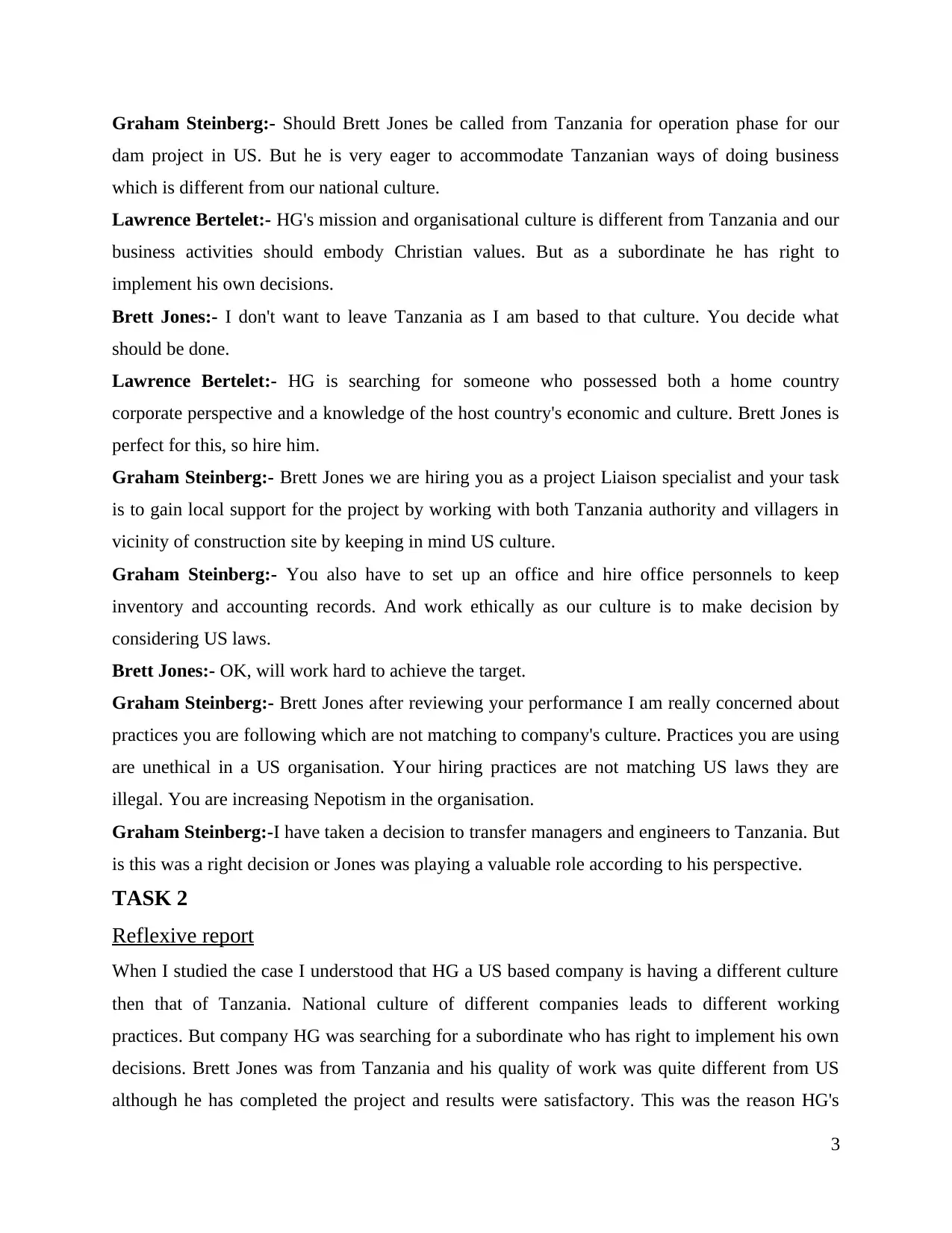
Graham Steinberg:- Should Brett Jones be called from Tanzania for operation phase for our
dam project in US. But he is very eager to accommodate Tanzanian ways of doing business
which is different from our national culture.
Lawrence Bertelet:- HG's mission and organisational culture is different from Tanzania and our
business activities should embody Christian values. But as a subordinate he has right to
implement his own decisions.
Brett Jones:- I don't want to leave Tanzania as I am based to that culture. You decide what
should be done.
Lawrence Bertelet:- HG is searching for someone who possessed both a home country
corporate perspective and a knowledge of the host country's economic and culture. Brett Jones is
perfect for this, so hire him.
Graham Steinberg:- Brett Jones we are hiring you as a project Liaison specialist and your task
is to gain local support for the project by working with both Tanzania authority and villagers in
vicinity of construction site by keeping in mind US culture.
Graham Steinberg:- You also have to set up an office and hire office personnels to keep
inventory and accounting records. And work ethically as our culture is to make decision by
considering US laws.
Brett Jones:- OK, will work hard to achieve the target.
Graham Steinberg:- Brett Jones after reviewing your performance I am really concerned about
practices you are following which are not matching to company's culture. Practices you are using
are unethical in a US organisation. Your hiring practices are not matching US laws they are
illegal. You are increasing Nepotism in the organisation.
Graham Steinberg:-I have taken a decision to transfer managers and engineers to Tanzania. But
is this was a right decision or Jones was playing a valuable role according to his perspective.
TASK 2
Reflexive report
When I studied the case I understood that HG a US based company is having a different culture
then that of Tanzania. National culture of different companies leads to different working
practices. But company HG was searching for a subordinate who has right to implement his own
decisions. Brett Jones was from Tanzania and his quality of work was quite different from US
although he has completed the project and results were satisfactory. This was the reason HG's
3
dam project in US. But he is very eager to accommodate Tanzanian ways of doing business
which is different from our national culture.
Lawrence Bertelet:- HG's mission and organisational culture is different from Tanzania and our
business activities should embody Christian values. But as a subordinate he has right to
implement his own decisions.
Brett Jones:- I don't want to leave Tanzania as I am based to that culture. You decide what
should be done.
Lawrence Bertelet:- HG is searching for someone who possessed both a home country
corporate perspective and a knowledge of the host country's economic and culture. Brett Jones is
perfect for this, so hire him.
Graham Steinberg:- Brett Jones we are hiring you as a project Liaison specialist and your task
is to gain local support for the project by working with both Tanzania authority and villagers in
vicinity of construction site by keeping in mind US culture.
Graham Steinberg:- You also have to set up an office and hire office personnels to keep
inventory and accounting records. And work ethically as our culture is to make decision by
considering US laws.
Brett Jones:- OK, will work hard to achieve the target.
Graham Steinberg:- Brett Jones after reviewing your performance I am really concerned about
practices you are following which are not matching to company's culture. Practices you are using
are unethical in a US organisation. Your hiring practices are not matching US laws they are
illegal. You are increasing Nepotism in the organisation.
Graham Steinberg:-I have taken a decision to transfer managers and engineers to Tanzania. But
is this was a right decision or Jones was playing a valuable role according to his perspective.
TASK 2
Reflexive report
When I studied the case I understood that HG a US based company is having a different culture
then that of Tanzania. National culture of different companies leads to different working
practices. But company HG was searching for a subordinate who has right to implement his own
decisions. Brett Jones was from Tanzania and his quality of work was quite different from US
although he has completed the project and results were satisfactory. This was the reason HG's
3
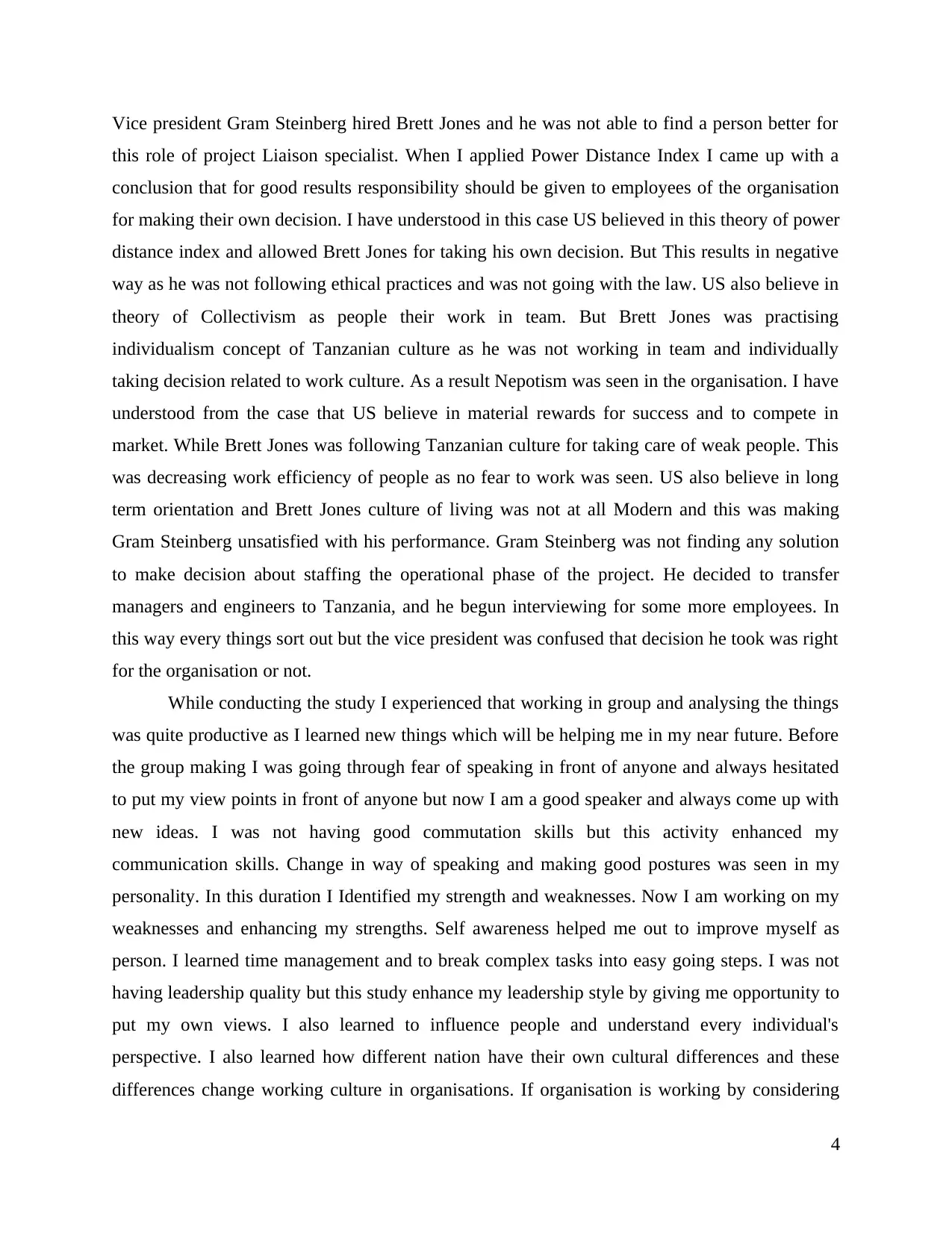
Vice president Gram Steinberg hired Brett Jones and he was not able to find a person better for
this role of project Liaison specialist. When I applied Power Distance Index I came up with a
conclusion that for good results responsibility should be given to employees of the organisation
for making their own decision. I have understood in this case US believed in this theory of power
distance index and allowed Brett Jones for taking his own decision. But This results in negative
way as he was not following ethical practices and was not going with the law. US also believe in
theory of Collectivism as people their work in team. But Brett Jones was practising
individualism concept of Tanzanian culture as he was not working in team and individually
taking decision related to work culture. As a result Nepotism was seen in the organisation. I have
understood from the case that US believe in material rewards for success and to compete in
market. While Brett Jones was following Tanzanian culture for taking care of weak people. This
was decreasing work efficiency of people as no fear to work was seen. US also believe in long
term orientation and Brett Jones culture of living was not at all Modern and this was making
Gram Steinberg unsatisfied with his performance. Gram Steinberg was not finding any solution
to make decision about staffing the operational phase of the project. He decided to transfer
managers and engineers to Tanzania, and he begun interviewing for some more employees. In
this way every things sort out but the vice president was confused that decision he took was right
for the organisation or not.
While conducting the study I experienced that working in group and analysing the things
was quite productive as I learned new things which will be helping me in my near future. Before
the group making I was going through fear of speaking in front of anyone and always hesitated
to put my view points in front of anyone but now I am a good speaker and always come up with
new ideas. I was not having good commutation skills but this activity enhanced my
communication skills. Change in way of speaking and making good postures was seen in my
personality. In this duration I Identified my strength and weaknesses. Now I am working on my
weaknesses and enhancing my strengths. Self awareness helped me out to improve myself as
person. I learned time management and to break complex tasks into easy going steps. I was not
having leadership quality but this study enhance my leadership style by giving me opportunity to
put my own views. I also learned to influence people and understand every individual's
perspective. I also learned how different nation have their own cultural differences and these
differences change working culture in organisations. If organisation is working by considering
4
this role of project Liaison specialist. When I applied Power Distance Index I came up with a
conclusion that for good results responsibility should be given to employees of the organisation
for making their own decision. I have understood in this case US believed in this theory of power
distance index and allowed Brett Jones for taking his own decision. But This results in negative
way as he was not following ethical practices and was not going with the law. US also believe in
theory of Collectivism as people their work in team. But Brett Jones was practising
individualism concept of Tanzanian culture as he was not working in team and individually
taking decision related to work culture. As a result Nepotism was seen in the organisation. I have
understood from the case that US believe in material rewards for success and to compete in
market. While Brett Jones was following Tanzanian culture for taking care of weak people. This
was decreasing work efficiency of people as no fear to work was seen. US also believe in long
term orientation and Brett Jones culture of living was not at all Modern and this was making
Gram Steinberg unsatisfied with his performance. Gram Steinberg was not finding any solution
to make decision about staffing the operational phase of the project. He decided to transfer
managers and engineers to Tanzania, and he begun interviewing for some more employees. In
this way every things sort out but the vice president was confused that decision he took was right
for the organisation or not.
While conducting the study I experienced that working in group and analysing the things
was quite productive as I learned new things which will be helping me in my near future. Before
the group making I was going through fear of speaking in front of anyone and always hesitated
to put my view points in front of anyone but now I am a good speaker and always come up with
new ideas. I was not having good commutation skills but this activity enhanced my
communication skills. Change in way of speaking and making good postures was seen in my
personality. In this duration I Identified my strength and weaknesses. Now I am working on my
weaknesses and enhancing my strengths. Self awareness helped me out to improve myself as
person. I learned time management and to break complex tasks into easy going steps. I was not
having leadership quality but this study enhance my leadership style by giving me opportunity to
put my own views. I also learned to influence people and understand every individual's
perspective. I also learned how different nation have their own cultural differences and these
differences change working culture in organisations. If organisation is working by considering
4
⊘ This is a preview!⊘
Do you want full access?
Subscribe today to unlock all pages.

Trusted by 1+ million students worldwide
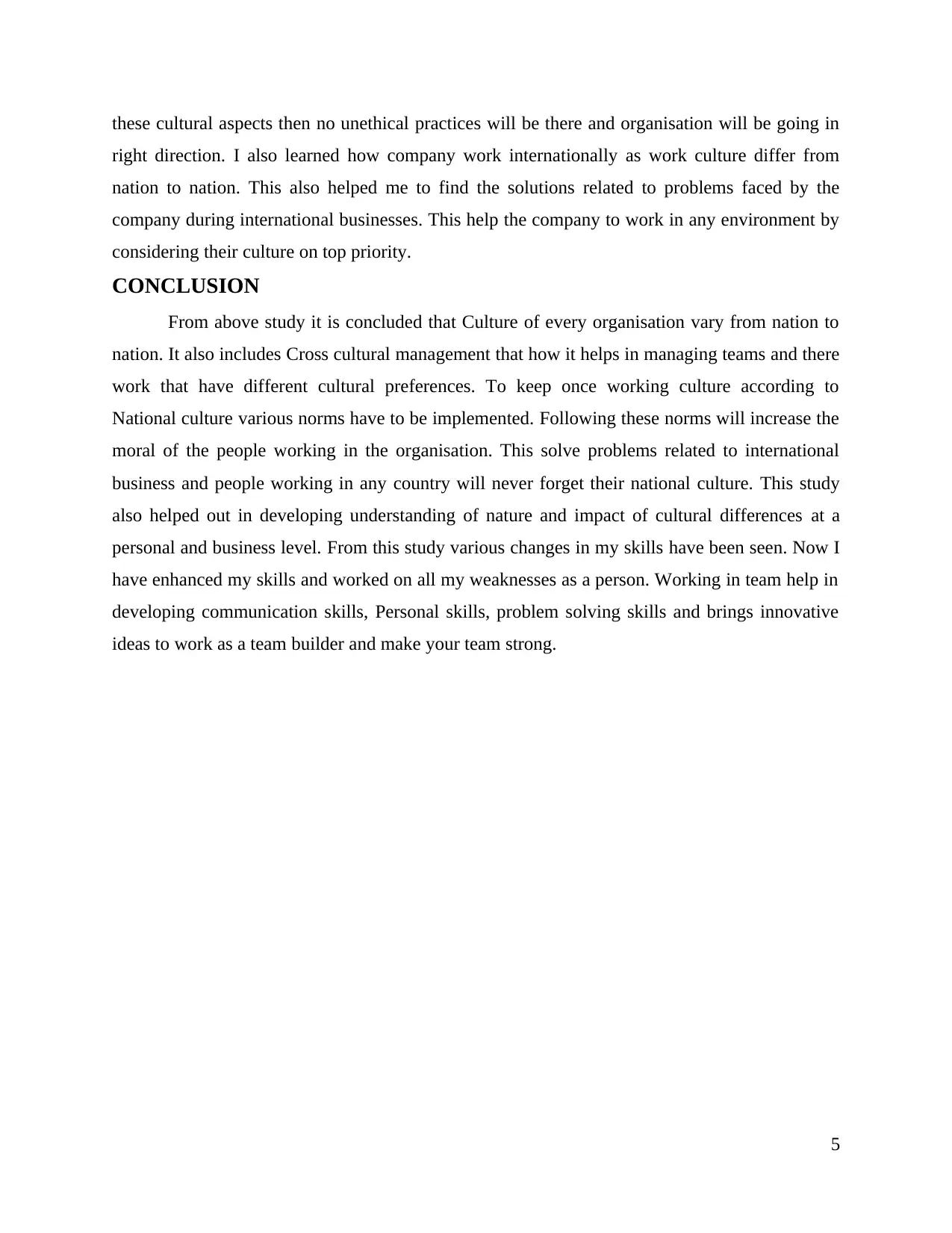
these cultural aspects then no unethical practices will be there and organisation will be going in
right direction. I also learned how company work internationally as work culture differ from
nation to nation. This also helped me to find the solutions related to problems faced by the
company during international businesses. This help the company to work in any environment by
considering their culture on top priority.
CONCLUSION
From above study it is concluded that Culture of every organisation vary from nation to
nation. It also includes Cross cultural management that how it helps in managing teams and there
work that have different cultural preferences. To keep once working culture according to
National culture various norms have to be implemented. Following these norms will increase the
moral of the people working in the organisation. This solve problems related to international
business and people working in any country will never forget their national culture. This study
also helped out in developing understanding of nature and impact of cultural differences at a
personal and business level. From this study various changes in my skills have been seen. Now I
have enhanced my skills and worked on all my weaknesses as a person. Working in team help in
developing communication skills, Personal skills, problem solving skills and brings innovative
ideas to work as a team builder and make your team strong.
5
right direction. I also learned how company work internationally as work culture differ from
nation to nation. This also helped me to find the solutions related to problems faced by the
company during international businesses. This help the company to work in any environment by
considering their culture on top priority.
CONCLUSION
From above study it is concluded that Culture of every organisation vary from nation to
nation. It also includes Cross cultural management that how it helps in managing teams and there
work that have different cultural preferences. To keep once working culture according to
National culture various norms have to be implemented. Following these norms will increase the
moral of the people working in the organisation. This solve problems related to international
business and people working in any country will never forget their national culture. This study
also helped out in developing understanding of nature and impact of cultural differences at a
personal and business level. From this study various changes in my skills have been seen. Now I
have enhanced my skills and worked on all my weaknesses as a person. Working in team help in
developing communication skills, Personal skills, problem solving skills and brings innovative
ideas to work as a team builder and make your team strong.
5
Paraphrase This Document
Need a fresh take? Get an instant paraphrase of this document with our AI Paraphraser
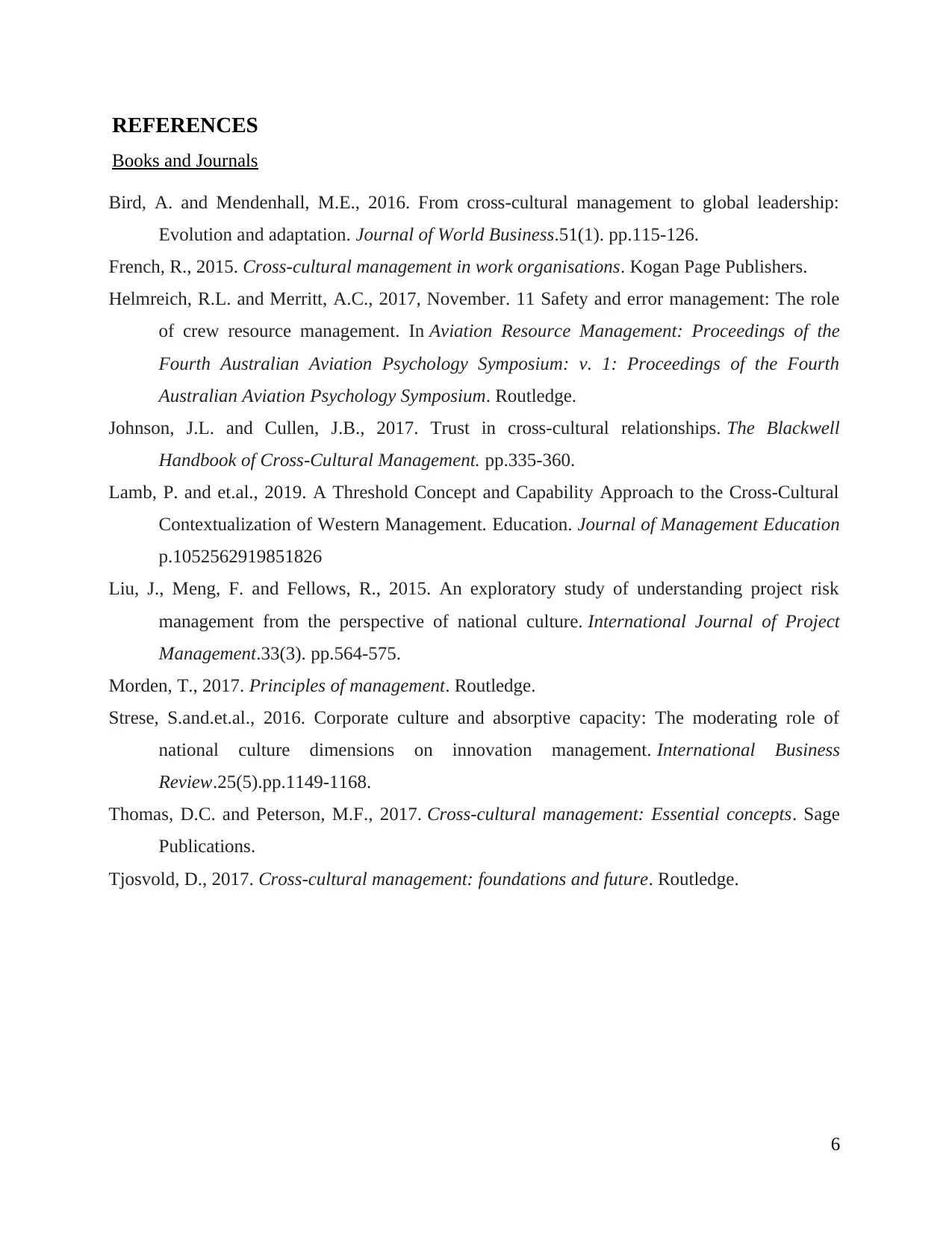
REFERENCES
Books and Journals
Bird, A. and Mendenhall, M.E., 2016. From cross-cultural management to global leadership:
Evolution and adaptation. Journal of World Business.51(1). pp.115-126.
French, R., 2015. Cross-cultural management in work organisations. Kogan Page Publishers.
Helmreich, R.L. and Merritt, A.C., 2017, November. 11 Safety and error management: The role
of crew resource management. In Aviation Resource Management: Proceedings of the
Fourth Australian Aviation Psychology Symposium: v. 1: Proceedings of the Fourth
Australian Aviation Psychology Symposium. Routledge.
Johnson, J.L. and Cullen, J.B., 2017. Trust in cross‐cultural relationships. The Blackwell
Handbook of Cross‐Cultural Management. pp.335-360.
Lamb, P. and et.al., 2019. A Threshold Concept and Capability Approach to the Cross-Cultural
Contextualization of Western Management. Education. Journal of Management Education
p.1052562919851826
Liu, J., Meng, F. and Fellows, R., 2015. An exploratory study of understanding project risk
management from the perspective of national culture. International Journal of Project
Management.33(3). pp.564-575.
Morden, T., 2017. Principles of management. Routledge.
Strese, S.and.et.al., 2016. Corporate culture and absorptive capacity: The moderating role of
national culture dimensions on innovation management. International Business
Review.25(5).pp.1149-1168.
Thomas, D.C. and Peterson, M.F., 2017. Cross-cultural management: Essential concepts. Sage
Publications.
Tjosvold, D., 2017. Cross-cultural management: foundations and future. Routledge.
6
Books and Journals
Bird, A. and Mendenhall, M.E., 2016. From cross-cultural management to global leadership:
Evolution and adaptation. Journal of World Business.51(1). pp.115-126.
French, R., 2015. Cross-cultural management in work organisations. Kogan Page Publishers.
Helmreich, R.L. and Merritt, A.C., 2017, November. 11 Safety and error management: The role
of crew resource management. In Aviation Resource Management: Proceedings of the
Fourth Australian Aviation Psychology Symposium: v. 1: Proceedings of the Fourth
Australian Aviation Psychology Symposium. Routledge.
Johnson, J.L. and Cullen, J.B., 2017. Trust in cross‐cultural relationships. The Blackwell
Handbook of Cross‐Cultural Management. pp.335-360.
Lamb, P. and et.al., 2019. A Threshold Concept and Capability Approach to the Cross-Cultural
Contextualization of Western Management. Education. Journal of Management Education
p.1052562919851826
Liu, J., Meng, F. and Fellows, R., 2015. An exploratory study of understanding project risk
management from the perspective of national culture. International Journal of Project
Management.33(3). pp.564-575.
Morden, T., 2017. Principles of management. Routledge.
Strese, S.and.et.al., 2016. Corporate culture and absorptive capacity: The moderating role of
national culture dimensions on innovation management. International Business
Review.25(5).pp.1149-1168.
Thomas, D.C. and Peterson, M.F., 2017. Cross-cultural management: Essential concepts. Sage
Publications.
Tjosvold, D., 2017. Cross-cultural management: foundations and future. Routledge.
6
1 out of 8
Related Documents
Your All-in-One AI-Powered Toolkit for Academic Success.
+13062052269
info@desklib.com
Available 24*7 on WhatsApp / Email
![[object Object]](/_next/static/media/star-bottom.7253800d.svg)
Unlock your academic potential
Copyright © 2020–2026 A2Z Services. All Rights Reserved. Developed and managed by ZUCOL.




